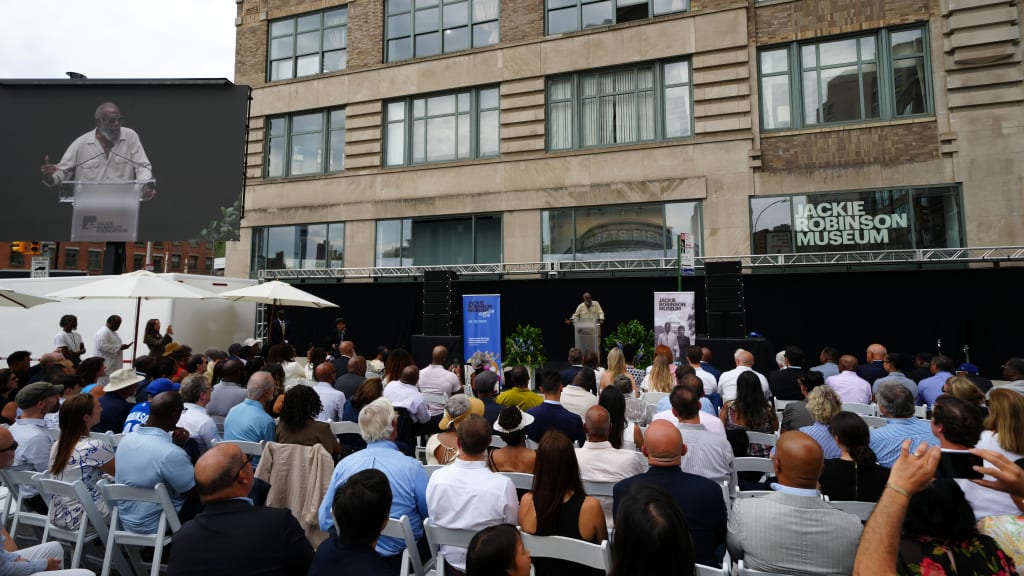
NEW YORK -- The Jackie Robinson Museum held a ribbon-cutting event Tuesday morning, commemorating its long-awaited opening in a quest to advance the legacy of Jackie Robinson.
The museum, located on Varick St. in Lower Manhattan and funded by the Jackie Robinson Foundation, will officially open to the public on Sept. 5. Its goal is to educate the public on the life, legacy and values of a civil rights pioneer who was the first to cross the MLB color barrier in 1947.
Special guests attending the highly anticipated ribbon-cutting included Jackie’s wife, Rachel, and their children David and Sharon, along with the President & CEO of the Jackie Robinson Foundation, Della Britton; New York City mayor Eric Adams; tennis legend Billie Jean King; former MLB pitcher CC Sabathia; and movie director Spike Lee.
“This moment in history is now a challenge for all of us. The issues that Jackie Robinson challenged in 1947 are still with us,” David Robinson said. “When you look at this museum, look at the greatness of the accomplishment, but also the challenges that were faced and the challenge that we face ahead of us.”
The ceremony was hosted by Robin Roberts of Good Morning America and featured several speakers, including Adams. The event began with a musical introduction by the Black Fire Marching Band as Rachel Robinson arrived at the museum to a prolonged standing ovation.
“The Jackie Robinson Museum will be New York’s epicenter for bringing Black history forward into the present,” Roberts said. “Today, the mission of the museum will be to educate, inspire, challenge and educate visitors about Jackie Robinson, the athlete, activist, patriot, entrepreneur, and family man.”
Featuring 4,500 artifacts and 40,000 historical images, the museum strives to achieve Rachel Robinson’s goal to inspire future generations to be the next group of leaders in the fight for social justice. These artifacts include letters, clothing, accolades, a timeline of his life and insightful videos throughout the museum that bring Robinson’s journey to life, detailing his accomplishments as a baseball player and civil rights pioneer.
These values of the museum and the Jackie Robinson Foundation are expressed poignantly by Rachel Robinson, who turned 100 on July 19, in a quote posted at the museum’s entrance.
“I hope this tribute to my beloved Jack ignites the humanitarian spirit in all of us, not only when we convene around sport, but in all of our interactions,” the quote reads. “May it spark dialogue that leads to better understanding of ourselves, our shared experiences, and the plight of others.”
As part of this initiative, the museum specifically strives to reach younger generations. This includes online programing in schools across the country already underway, with the museum also featuring classroom spaces.
Britton spoke specifically about the importance of the new museum inspiring the next generation of activists.
“What we're excited about now is putting the programming in place,” she said. “Bringing in kids to not only learn about Jackie but to be inspired by Jackie.”
King, a world-renowned tennis player and advocate for social justice, also spoke to the importance of Robinson’s legacy and the impact of the new museum.
“I used to walk down here, where they used to say there's going to be the Jackie Robinson Museum. And now it's actually happening ... today,” said King, who is a member of the Dodgers' minority ownership group. “I think about it every day. I still think about [Jackie], his legacy and how we all have to keep fighting for equality, get rid of racism and be good to each other. It's not rocket science.”
Sabathia also added context to the magnitude of the museum opening and the legacy of Jackie Robinson.
“Without him, there would be no me,” Sabathia said. “I wouldn't be standing here. I wouldn’t have been able to live out my dream of playing Major League Baseball. It's not just the baseball stories, it’s the American story. This museum is a long time coming and I'm glad to be here today.”
“Today, 75 years after Jackie broke the color barrier in our great city, I am immensely proud to honor his life, his wife and his achievements and join us in celebrating the grand opening of Tribeca’s Jackie Robinson Museum,” Mayor Adams said.
The museum provides another reminder of Jackie and Rachel Robinson’s legacy as activists who never stopped pushing for change, something that Jackie embraced throughout his life and Rachel continued to advocate for after Jackie’s passing.
As Jackie once said, “Life is not a spectator sport. If you're going to spend your whole life in the grandstand just watching what goes on, in my opinion, you are wasting your life.”
Reminders of Jackie’s life’s work are everywhere – including both at the new museum and on modern-day baseball fields.
"The legacy of [Jackie for] kids today is just watching the current players,” Sabathia said. “There would be no Mookie Betts, Aaron Judge, none of these current stars without Jackie. To have this museum here and have these kids understand the importance of Jackie Robinson and [his] relevance to today's game … I think it's important."
Michael Charles is a reporter for MLB.com. Follow him on Twitter @MikeCharles317.
